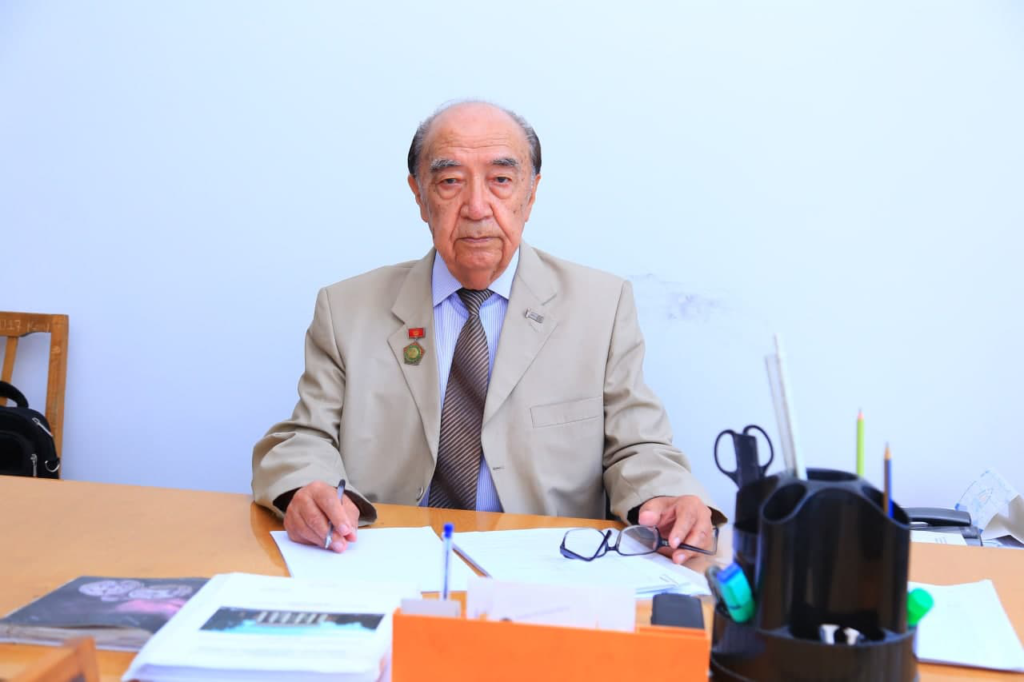Department of Editorial and Scientometric Analysis

Esenbek Belek uulu
Head of Editorial and Scientometric Analysis Department
E-mail: naukametrikaknau@gmail.com
E-mail: esenbekbelekuulu@gmail.com
Phone.: 0(312) 54-04-32
Mob.: 0(777) 19-97-54 (W/A)
The staff structure of the department of editorial and scientometric analysis:

Kemel Kerimov
Chief Specialist of the Department of Editorial and Scientometric Analysis
Phone.: 0(312) 54-04-32
Mob.: 0(558) 44-75-33
E-mail: naukametrikaknau@gmail.com

Tologon Kerimov
Methodologist of the department of editorial and scientometric analysis
Mob.: 0(707) 52-18-33
E-mail: naukametrikaknau@gmail.com
Email: izdanie_knau@mail.ru

Nurbek Asangaziyev
Editorial and Scientometric Analysis Department Specialist
Phone.: 0(312) 54-04-32
E-mail: naukametrikaknau@gmail.com
Scientometric analysis is necessary to assess the level of development of science, the productivity and relevance of individual researchers and the organization as a whole, an indicator of the informational significance of a periodical. One of the methods of quantitative analysis is the use of citation to assess the development of scientific fields and the informational significance of scientific journals based on citations. The most important scientometric indicators include research activity (the number of published scientific papers) and citation (the number of citations to published scientific papers, the proportion of cited papers, the average number of citations to a scientific work, etc.) and indices calculated on their basis: citation index, index Hirsch (h-index), normalized citation indices, maximum citation index (f-index).
The purpose of the creation of the Department is to improve the quality and level of scientific content, credibility, competitiveness, scientific rating, impact factor of the journal published by the University, bringing the journal to the level of an international high-ranking scientific publication with the ultimate goal of being included in the global international scientific databases Web of Science / Scopus. Wider presentation of research materials of university scientists in domestic and foreign scientific databases, information systems and citation systems, contributing to an increase in the rating of the journal, faculty, researchers and the University as a whole. In its activities, the Department is guided by: the current legislative acts of the Kyrgyz Republic, orders of the Ministry of Agriculture of the Kyrgyz Republic and the Ministry of Education and Science of the Kyrgyz Republic, the Charter of the University, the Collective Agreement of the University, QMS documentation adopted at the University and the Regulations on the Department.
- Organization of the collection of scientometric information, its systematization, analysis and control over the timely provision of information by the scientific departments of the University;
- Monitoring, systematization, analysis, planning, and control of publication activity and citation of the teaching staff and scientific personnel of the University;
- Methodological support of the work of the structural divisions of the University on the issues of increasing publication activity and citation indicators;
- Control of the formation and maintenance of an information database of scientific publications of the teaching staff and scientific personnel of the University;
- Organization and holding of events to improve the skills of the University employees and third-party specialists in the field of modern methods and technologies of scientific work using national and international information systems, citation systems and databases, indicators of publication activity and citation;
- Assistance in the development of publication activity and citation at the University, including participation in the organization and improvement of the procedure for their stimulation, participation in the development of local regulations that determine the conditions, amounts and procedure for accruing rating points or paying remuneration to authors;
- Preparation and submission of reports and analytical reports on scientometric indicators of the University’s activities to the Ministries, departments, management of the University and relevant departments of the University;
- Organization and holding of seminars, personal meetings and consultations on issues within the competence of the Center, with those responsible for scientific work (at the faculties, departments and scientific divisions of the University), as well as with the teaching staff, scientific personnel, doctoral students, graduate students and students University;
- Interaction with young scientists of the University on issues of increasing publication activity and citation rates;
- Development, publication and distribution among the faculty and scientific staff of the University of methodological and reference materials, manuals and recommendations aimed at improving the culture of intellectual activity and indicators of publication activity, mastering modern methods and technologies of scientific work using national and international information systems.
- Organization of monitoring of publications in the areas of research activities of the university in Russian and foreign sources and analysis of its results;
- Forecast based on the analysis of the publication activity of leading Russian and foreign specialists and organizations of promising areas for the development of research activities in the agro-industrial complex as guidelines for the scientific departments of the University;
- Development and joint implementation with the relevant structural divisions of the University of activities aimed at improving the scientometric indicators of the University and its employees;
- Scientometric studies of the effectiveness of research work carried out at the University;
- Advising leading scientists of the University – authors of publications on international citation systems, the Russian Science Citation Index;
- Registration of leading scientists of the University in the Scientific Electronic Library (NEB);
- Registration of the leading scientists of the University in the Science Index system, correspondence with the NEB, obtaining individual Spin-codes;
- Implementation of an automated search for publications and citations of leading scientists;
- Conducting an additional search for publications and citations (collection, analysis and editing manually);
- Preparation of recommendations for authors on the whole range of scientometric issues;
- Scientometric work to determine the total publication activity and citation of leading scientists, identify the most active authors, track the number of citations, etc., manage scientometric information;
- Compilation of ratings, preparation of analytical presentations (with an analysis of publication activity and citation) of leading scientists and the University as a whole;
- Conducting official registration through the Science Index system of found publications and citations in the database of the Scientific Electronic Library (NEB) of the Russian Science Citation Index (RSCI) using individual Spin-codes;
- Development of plans-algorithms for the optimal improvement of the Hirsch indices of leading scientists and the University as a whole;
- Carrying out a comparative assessment of the informational significance of scientific journals published at the University and in the region, a comparative assessment of the informational significance of Russian journals operating in this segment.
- Stimulation of the growth dynamics of the impact factor of the published journal;
- Comparative assessment of the dynamics of growth in the citation of the published journal in a competitive environment;
- Presentations at the Scientific and Technical Council (STC) of the University and faculty scientific councils with the results of the analysis and recommendations on this issue;
One of the main elements of the assessment of the activity of a researcher is his scientific productivity and weight (informational significance), which are determined by publication activity and citation. An integral indicator is also used – the Hirsch index, which simultaneously takes into account both publication activity and citation. According to these indicators, the activity of both an individual scientist and the organization as a whole is evaluated. Unfortunately, we are not as good with citation as we would like. We don’t have a citation tradition yet! Remember: when writing a paper, it is necessary, as is customary in scientific research at an international level, to refer to all significant and notable works in this area. This is an element of scientific culture. The poverty of bibliographic reference lists should be considered as a sign of the lack of scientific culture. Everyone should be aware of the works of other KNAU scientists working in this and related fields in order to correctly cite. This is in the interests of everyone and everyone.
When placing articles in other publications, do not forget and do not hesitate to notify your colleagues working not only in KNAU, but also in other organizations about the published article. This will significantly expand the circle of your scientific communication and citation. Preference should be given to high-ranking publications and magazines. In this case, there are more chances to get into international information systems – Web of Science, Scopus, SpringerLink, Agris, which track such publications. It is necessary to raise the impact factor of our journal. This will bring your research to the international level, will significantly affect the authority and prestige of both the scientists – the authors of the work, and the organization as a whole.
Remember that in the database – RSCI only machine processing of electronic copies of articles is carried out. Archive of electronic copies, as a rule, not earlier than 2006. Therefore, the most recent papers should be cited (and in terms of increasing the current impact factor of the journal, for the last 2 years, i.e., to increase IF2016, papers published in 2014-2015 should be cited).
Remember, increasing citation through self-citation is the easiest way, but it should be borne in mind that self-citation is currently significantly limited: in international information systems – up to 20%, in the RSCI – up to 40% (previously 60%). Good luck and creative success for the benefit of KNAU!